Product Overview
Kawai’s RX1 grand piano literally changed the piano industry. The RX1 featured Kawai’s exclusive Millennium III action with Carbon Fiber, stellar performance for a sub-6′ piano, and its overwhelmingly positive reception by the professional community made this a must-have through the late 1990s, right through until 2013. So how could Kawai improve on such a success? It turns out, in some remarkably innovative ways.
The extended key length on all of the GL’s has made these instruments even more effective as practice and training pianos for aspiring professional players, 3 hours on a GL-30 is now just as effective as 3 hours on a 9′, thanks to a similar key stick length. The full-perimeter rim (accomplished by the use of a stretcher bar across the front) gives the piano incredible resonance and power. And the addition of an extra length of string makes the instrument practically a 6′ contender (it comes in at 5’5″).
Despite Kawai marketing their GL series as the lower-cost home version of their GX series instruments, the GL30 is actually also a very popular choice among music colleges, churches, and small venues – really, any institution that requires a highly musical, yet dependable 5’5″ grand piano without moving into the high pricing of traditional “institutional” instruments.
Action
A staple throughout more and more of Kawai’s lineup (including their high-end digital pianos even) is the Millennium III action featuring ABS-Carbon technology. Much praise has been given to this action in countless reviews, videos, and awards, and for good reason – it’s highly responsive, easy to control, and with a repetition speed capable of even the most advanced classical music, not to mention, highly durable given the presence of Carbon Fiber. The keytops are made from acrylic which is nice on the fingers.
As mentioned above, the extra-long key sticks are a hugely welcome feature for anyone seeking greater control out of their action, and is especially beneficial for those who participate in recitals or competitions where they will be performing on a 9 ft concert grand.
Kawai has also steel-reinforced the keybed and keyslip with steel, meaning the odds of the piano getting banged and having to deal with sticky or even totally stuck keys is greatly decreased.
Tone
The GL-30 produces a far more dynamic tonal range than their previous 5’5″ models in this price category. Like all Kawai pianos, the overall character is warm and on the darker side as compared to a Yamaha for example, but given the aforementioned dynamic range, it’s easy to push this action to get a slightly brighter tone when needed.
There are solid brass agraffes for ideal string spacing, and full-duplex scale for increased harmonics in the upper register. Kawai has also elected to use a Multi-Grip 11-Ply Laminated Pin Block for greater tuning stability.
Hammers
As a throwback to traditional piano craftsmanship, Kawai makes their own hammers in-house as opposed to out-sourcing them – one of only three manufacturers today who do so. The GL30 features double felted, maple core hammers.
Soundboard
The GL-30 features a solid spruce precision tapered soundboard. Tapering is an advanced technique that helps achieve maximum energy transfer and optimum power. No one would dispute that tapering a soundboard results in optimum energy transfer, but given the extra costs involved in doing this, this technique is virtually unheard of with pianos in this class.
Rim/Cabinet
There are so many things to talk about when it comes to the rim of the GL30. For starters, there’s the Stretcher Over-Lap Integrated Design (SOLID for short) with a double-width stretcher bar. This design ensures enhanced tuning stability, and means the structure of the piano should ultimately last longer.
Kawai V-Pro plate utilized gray iron with a unique crossbone design for optimum strength, and there’s an ultra-slow soft fall fallboard to protect fingers and minimize sticky keys.













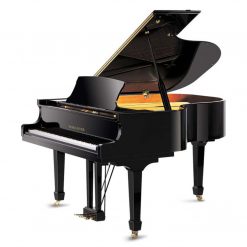






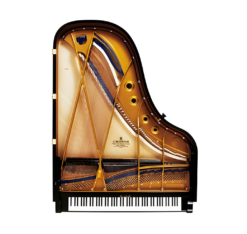
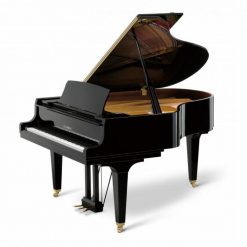
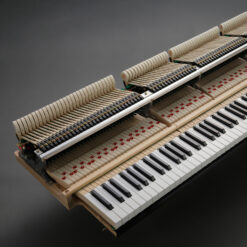


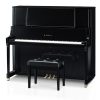


Reviews
There are no reviews yet.